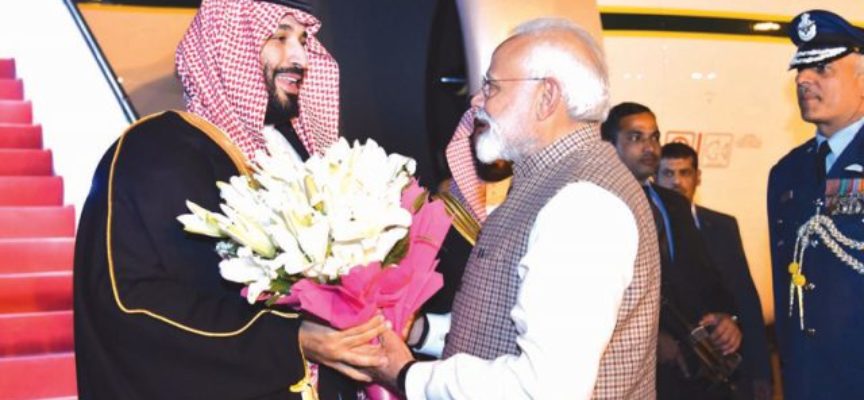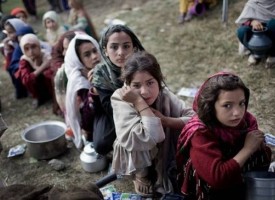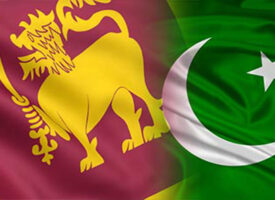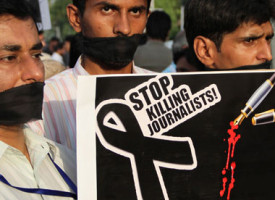Since its independence in 1947, the State of Pakistan has enjoyed a special status in the Muslim world for its pronounced creation in the name of Islam. Muslim residents of Arab countries including Iran, Turkey, occupied Palestine and erstwhile USSR member states were always behind Pakistanis when it came to proper democratic functioning, an efficient bureaucratic/state machine and robust armed forces.
In fact, almost a decade before Pakistan came into being, its founding fathers vowed to support the cause of Arab countries especially liberation of Palestine from occupying Israeli forces.
Pakistan has made innumerable contributions for the welfare and protection of Arab countries but its relationship has by and large been confined to the security spectrum instead of leveraring any meaningful economic relations; India, on the other hand, enjoys great economic inter-dependence with Arab countries, particularly GCC states.
In fact, the latest available official Indian foreign trade statistics reveal India imported approximately $640,000 worth of goods from West Asia/ GCC countries exported goods worth almost $437,000 in the month of May 2019 alone, UAE being the largest partner in both aspects.
A recent report by the Associated Press highlights that Arab Gulf countries have mostly remained silent in the aftermath of India’s illegal annexation of Occupied Jammu & Kashmir on account of their cumulative annual trade worth more than $100 billion with India.
Economics is not the only factor which has compelled Arab countries to adopt this silence; Pakistan’s refusal to send troops to fight against Houthis in Yemen had severely snubbed the Saudi and Emirati monarchies; UAE’s Minister of State for Foreign Affairs Dr Anwar Mohammed Gargash revealed the level of exasperation during an outburst in April 2015 including warnings of paying a “heavy price” for Islamabad’s perceived ‘ambiguous stand’ on Yemen.
Islamabad’s relation with Arab countries have been zig-zagging without any clear policy direction; for example, despite the recent bonding with Saudi Arabia and the UAE after coming to power, Prime Minister Imran Khan’s government continues to uphold special ties with the Thani royal family of Qatar. As if Doha’s growing relations with Tehran were not enough, Islamabad too has made overtures to the Shia-majority state in view of its principled brotherly neighbourhood policy.
This confusing potpourri of adhoc foreign relations in intra-Arab and Arab-Iran ties can be credited to the previous government of former Prime Minister Muhammad Nawaz Sharif who, for reasons unknown, held the additional portfolio of Foreign Minister. As of today, Ministry of Foreign Affairs (MoFA) is clueless about the sort of relations it is supposed to maintain within the world and, externally, balancing these with its ties to Iran.
It is surprising, therefore, that despite maintaining close strategic relations with both Israel and Iran who are each other’s sworn enemies and, concurrently, of the entire Arab world; India’s relations with Arab countries continue to prosper on the upward trajectory. Evidently, strong economic/trade interdependence has given New Delhi the free space to navigate according to its principles of non-alignment or strategic autonomy. Relations with two diametrically-competing strategic blocs is managed well. Plus also India’s large and skilled HR pool and a socio-culturally active diaspora.
Defence and security have been Islamabad’s trump cards for acquiring strategic benefits from Arab countries, and these may also be overshadowed soon by India; earlier this month, the UAE placed an order worth more than $45 million for procurement of 50,000 artillery shells for Bofors guns by Ordnance Factories Board (OFB).
Silence by Arab countries on Pakistan’s request to take note of Indian aggression may be perceived as ‘criminal’ at a domestic level. At the regional level, though, Islamabad can blame none but itself for its directionless foreign policy manoeuvering in the Middle East over the past decade. India, despite initiating aggression against Pakistan through two so-called surgical strikes (2016 and 2019) managed to assert itself diplomatically and economically with the Arab world in parallel.
Against this backdrop, non-partisan statements on Pakistan’s appeal for Jammu & Kashmir by Arab countries can be understandable. The UAE, however, has apparently gone a step beyond by proclaiming Home Minister Amit Shah’s gameplan as “an internal matter“.
The Prime Minister’s cabinet members would be well advised to avoid discreetly taunting the Arab world’s silence and focus on putting their house in order. The same Minister in question was extremely praiseworthy of Saudi and Emirati leadership for their support in the aftermath of the Pulwama attack.
The Arabs have not changed heart; perhaps they are wondering what viable alternative Pakistan can provide to BJP’s ambitious ‘$5 trillion economy‘ which will include areas of Occupied Jammu & Kashmir? Prime Minister Narendra Modi appears determined to invest heavily in the new ‘Union Territories‘, using economic power as a strategic leverage for internal security.
As a first step, the Prime Minister of Pakistan should encourage outreach to Arab countries by Information, Commerce, Foreign and Defence ministries in tandem, not isolation. Initiatives taken now will take years to yield fruit and undo the rot caused by political exploitation of diplomacy since 2008.
Perhaps then Islamabad will have earned the weightage to demand absolute support on issues of critical national importance.







The biggest misunderstanding for Pakistan is playing the you Muslim we Muslim game with the Middle East, the Arabs had no intentions of religious unity with any Muslim country, the relations have always been about money and trade.
Pakistan needs to wake up and smell the coffee and start creating alliances with other Asian and European countries for trade and support in our interests. Arabs have clearly shown time and time again, they are only about business, coming religious companionship has nothing to do with it.
The writer considers India’s policy a solid policy of non alignment but blames Pakistan of being clueless when Pakustan tries to strike a balance between KSA+UAE and Qatar +Iran.
Hi. I find Pakistan clueless because of an undefined/ undeclared Middle East policy beyond the usual rhetoric. If such a policy does exist, Islamabad has clearly reaped any dividends. India has played its relations to economic advantage, the indicators and statistics testify.